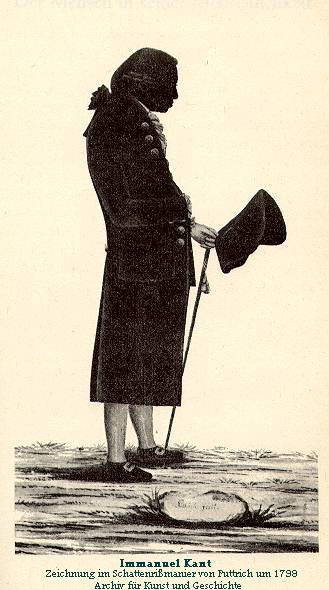Immanuel Kant died on February 12 in 1804. In preparation for that anniversary, here are links to nine liberal/libertarian philosophers who argue whether Kant is or is not classically liberal.
Mark D. White, “Defending Kant’s Classical Liberalism.” Professor White argues that Kant’s politics gives individuals the liberty to act on the products of their deliberation and that Kantian political liberty is a natural outgrowth of his emphasis upon autonomy.
Stephen R. C. Hicks, “Does Kant Have a Place in Classical Liberalism?” Professor Hicks argues that if our case for liberty comes from a mysterious other realm — as it does in Kant’s appeal to the noumenal — then we have no case at all.
 Roderick T. Long, “Kant: Liberal, Illiberal, or Both?” Professor Long argues that Kant is more often liberal in principle than in practice.
Roderick T. Long, “Kant: Liberal, Illiberal, or Both?” Professor Long argues that Kant is more often liberal in principle than in practice.
Gregory Salmieri, “Is Kant the Ideal Statement of Classical Liberalism?” Professor Salmieri argues that Kant’s duty ethics leaves no room for the pursuit of happiness — and thus leaves no room for individual rights. An ethics of duty can also coexist with an authoritarian regime.
Jason Brennan: “Rand on Kant: Let’s Use This as a Teaching Moment.” Professor Brennan argues that Ayn Rand badly misinterprets Kant’s ethics as presented in the Groundwork, most likely this passage in particular.
Chris W. Surprenant, “Kant and Classical Liberalism: Friends or Foes?” Professor Surprenant argues that Kant’s advocacy of coercive taxation to support the poor is compatible with his promotion of individual autonomy, as redistributive taxation secures the minimal external conditions necessary for autonomy.
Jason Sorens, “Immanuel Kant and the Philosophy of Freedom.” Professor Sorens argues that if we want to understand the moral basis of a free society, there might be no better place to start than the thought of Immanuel Kant.
George H. Smith, “Immanuel Kant on Our Duty to Obey Government.” In this entry in a series on Kant’s politics, George Smith explains Kant’s basic justification of government and why he opposed the rights of resistance and revolution.
Jason Kuznicki, “Arguments for Liberty: Kantianism.” Dr. Kuznicki argues that Kantian categorical-imperative ethics provides the best principled foundation for liberal society and politics.
Related: In this essay, “Kant versus Classical Liberal Justice,” I argue that an important argument from Kant’s Lecture’s on Ethics puts Kant at odds with justice properly conceived.

A valuable reference. I was only aware of some of these. Thank you.
I think Rand was right in saying that in philosophy politics is more an effect than cause, predicated on a view of metaphysics, epistemology, and ethics.
A self is an individual in the first person. I think Rand was right in suggesting that Kant’s attack on the concept of the ethical self and self-interest was the sine qua non for the political attack on the individual and the still philosophically fragile concept of individual rights that paved the road to the inferno of modern collectivism-totalitarianism.
Kant lived through the rise of such things as state education in Prussia – he did not, as far as I am aware, oppose the general statism of the domestic policy of Frederick the Great.
As for government taxation to “help the poor”, the modern West has seen where that principle leads – to a government that takes about half the entire economy in taxation (mostly to “help the poor”) and a state that undermines and destroys non state cultural institutions such as the family and mutual aid associations.
thanks for these videos, greetings from Mexico